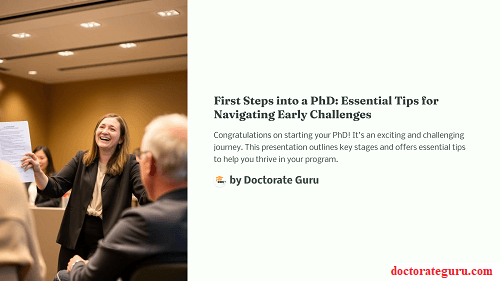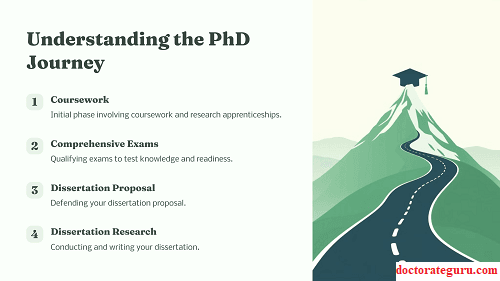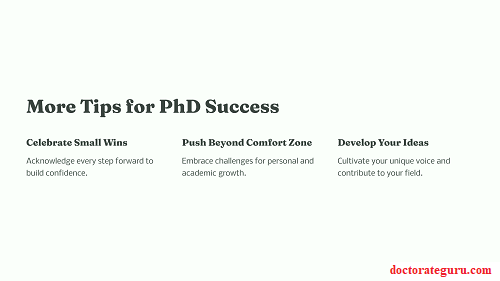So, you’ve been accepted into a PhD program. Congratulations! It is indeed an exciting time. It can also be a daunting time. Beginning a PhD program is as exciting as it is challenging. There will be a profound transition from being a student in a Master’s program to becoming a researcher in a doctoral program. The hopes, fears, and challenges of beginning a doctoral program have been expressed in various forums, and it is abundantly clear that doctoral students are not alone in these experiences.
Starting a PhD program can still be challenging despite completing your Bachelor’s and Master’s programs in a related or same discipline. This is not because you are unprepared or not prepared enough; it is common, and many PhD students have called it quits. The good news is that if you continue, you will gradually gain confidence, notwithstanding that the anxiety of making mistakes may continue to persist.
This feeling is more pronounced for new PhD students, especially those who have relocated abroad for their doctorate studies. Drawing from my recent experiences, I have gathered a few insights, “Essential Tips for Navigating Early Challenges in PhD” that I would like to share. The purpose here is to briefly outline the stages of a typical PhD program, ensuring new students know what they are getting into.
What is a PhD?
A PhD, or Doctor of Philosophy, is the highest academic degree awarded by universities in most countries. The significance of a PhD might seem obvious, it means you’ve reached the pinnacle of education, and gained a level of expertise above that of the majority of the population, but some misconceptions muddle this understanding.
A PhD, however, is a research degree, and as such, the onus is on you to design and implement the research project that will win you the degree. Although it is hoped that you will be adequately supported by your supervisory team and be able to seek advice and guidance from fellow students.
Key Stages of a PhD Program
Accomplishing a PhD is an immense task, typically comprising four key stages:
- Coursework and research apprenticeships
- Comprehensive exams (or their equivalent, e.g., prelims, qualifying exams)
- Dissertation proposal defense, and
- Dissertation research.
Understanding these stages is crucial for effectively managing expectations and developing strategies to overcome obstacles.
Essential Tips for Navigating Early Challenges in PhD

Tip 1: Acknowledge and Overcome Impostor Syndrome
Have you ever felt like you made the wrong decision to start a PhD or do you feel like you don’t belong in your PhD program? Does it feel like someone is gonna tap you on the shoulder and tell you, “Sorry we made a mistake, you are at the wrong place”? If you have felt this way before, then like Michael Jackson said in his record, “You are not alone”.
Starting your doctoral study is daunting and not without its challenges in the early months and years. Even graduate school veterans can find themselves underprepared or overwhelmed by expectations and responsibilities in a new environment. Impostor syndrome often feels inescapable in graduate school. Perhaps it manifests as a notion that everyone else seems smarter, more well-read, or far better at researching and writing and that soon enough, everyone will realize you have been faking competence all along.
Recognizing these feelings as part of a shared phenomenon is crucial and you have to know that everyone in a PhD program is qualified including you. To fundamentally address impostor syndrome, the first thing is to recognize that these feelings are normal and temporary. Then talk about it, and share your feelings with peers or mentors, you’ll quickly realize you’re not alone and finally celebrate small wins, like mastering a new technique or understanding a complex paper.
Tip 2: Start Small – Get Your Hands Dirty Early
Imagine trying to learn swimming by only reading about it. Sounds ridiculous, right? The same goes for your PhD. The best way to understand something is to try and do it. Starting small is a useful way to get your hands dirty early on with some research, whether that means a small project you’re running on your own or just assistance with a few small tasks. It might feel trivial to be doing small things like running a few simulations, collecting data from experiments, or getting reading lists together, but these things teach you so much.
Incremental progress adds up over time and builds confidence along the way. Skills that will come in handy later are being developed long before they feel necessary. By initiating smaller projects more or less yourself, you can settle into the research process without becoming overwhelmed. So the best way to get it done is to get started and to get started, you need to break tasks into smaller steps. That is, focus on manageable goals, like mastering one procedure or analyzing one dataset at a time.
Tip 3: Build Your Support Network
Just like in a football match, neither Lionel Messi nor CR7 can boast of winning a match singlehandedly without the contributions of their teammates. Think of your PhD as a team sport, even if you are the star player, you cannot win a game without a strong team behind you. As highlighted in the previous tips, things can become challenging during the early years of a PhD and sometimes things might not go completely to plan. However, having a great support network will make navigating the PhD journey and early challenges much easier.
A support network might consist mainly of your lab mates, peers, and mentors, but it’s also important to build a good relationship with your supervisor. Having a mentor is important as they have been in the same position as a new PhD student and can often see things from a different perspective. Building these relationships might take a little time, but with some effort, it should be possible to create a mutually supportive group. Networking is key to building a support network beyond your institution, so try to attend at least two conferences or workshops each year.
Tip 4: Celebrate Small Wins to Build Confidence
Are you aware of the common saying that “a PhD is a marathon”? In a marathon, are you also aware that every single step forward is progress, and in the PhD marathon, every small win counts? It’s easy to get caught up in the big picture and forget how far you’ve come. But celebrating every small win is crucial for building confidence and staying motivated. It is essential to tip the balance in the other direction by frequently acknowledging and celebrating efforts and good results, however small.
By recognizing incremental wins, motivation and morale can be significantly boosted. Keeping a simple record of achievements can help immensely, each time something good happens, be it minor or major, write it down. It is entirely up to you what qualifies as a win, whether it is collecting new data, understanding a new concept, coping with an adverse situation or even just having a good day. For bigger achievements, it is worth developing a habit of rewarding yourself more substantively.
Tip 5: Push Beyond Your Comfort Zone
“Life begins at the end of your comfort zone.”– Neale Donald Walsch. A comfort zone is a beautiful place, but nothing ever grows there. If you’re not feeling challenged, you’re not growing. It is essential to start embracing challenges rather than avoiding them. PhD students are on the verge of significant personal and academic development, but growth requires stepping beyond the comfort zone. Comfort zones feel nice for a reason, however, it also involves limiting what you can do. When a particular zone feels too comfortable, it is generally time to expand it.
Growing usually happens in moments of discomfort, so it is important to remind yourself to embrace every situation that makes you uncomfortable as a learning opportunity rather than a threat. The advice is to constantly push a little more – go for research topics you think you cannot do, risk looking silly in discussions, take on public speaking obligations, and apply to things that sound only vaguely attainable. It is better to take charge than react to imposed challenges because taking charge encourages a mentality in which failure is part of the ride rather than a painful dead-end.
Tip 6: Develop Your Own Ideas and Voice
Your PhD is your chance to leave your mark on the world. But first, you need to find your voice. It is crucial to start cultivating your ideas and voice as soon as you begin a PhD. It may take time to articulate these ideas and find your voice, but it is vital to think about them constantly. Take responsibility for finding ways to engage with your ideas. Regular brainstorming or similar activities can help develop and refine ideas. Try to think of at least one original contribution to your field, no matter how small, in your research.
It is also important to remember that your voice is shaped by those around you. Discussing work with others is essential, as different people will draw out different aspects of your thinking. Some will help clarify ideas, while others will force a harder examination of them. External perspectives often spotlight what is crucial in a voice, as well as its strengths and weaknesses. Take every opportunity to discuss work in progress with trusted peers and mentors. A distinct academic identity takes time to cultivate but is essential to a fulfilling and impactful PhD.
Conclusion
Most of these points arose from personal experience, while others emerged from best practices shared by mentors, colleagues, and successful PhD candidates from a range of disciplines. While each discipline is different, the expectation is that many readers will be at a similar life stage. The hope is that sharing these strategies will offer comfort and help students thrive in their newly chosen academic environments.
The tips provided here are not exhaustive, nor are they a one-size-fits-all solution, but they are practical advice geared toward the most common early challenges in a PhD journey. It is important to remember that so many have trodden this path before and that with the right strategies you can thrive.







